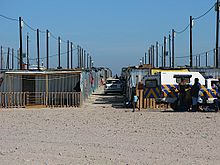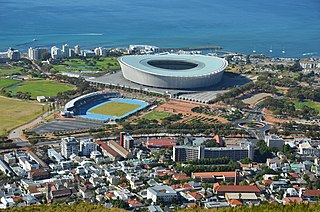Social effects
Security
Tournament organiser Danny Jordaan dismissed concerns that the attack on the Togo national team which took place in Angola in January 2010, had any relevance to the security arrangements for the World Cup. [1] There have been claims that the police have implemented a de facto state of emergency by banning protests during the event. [2]
Major General Qassim al-Moussawi of Iraq's security services said the arrest of Abdullah Azzam Saleh al-Qahtani, allegedly a former Saudi army lieutenant, yielded information that "He was planning a terrorist act in South Africa during the World Cup based on plans issued by the central al Qaeda terrorist organisation in coordination with Osama bin Laden's first assistant, Ayman al-Zawahri." [3]
There were also reports of thefts against visitors to the country for the World Cup. Tourists from China, Portugal, Spain, South Korea, Japan and Colombia had become victim to crimes. [4] Three members of the Greece national team reported that £1,300 had been stolen from their rooms. [5] These reports came after the British media cautioned visitors about such security threats. [6]
In Iraq, the improved security situation has allowed people to watch matches in public places. This is in contrast to 2006 when violence prevented people from gathering publicly. [7] Radical militant groups in Somalia have banned the watching of televised World Cup matches, and had initially threatened to punish with public floggings, [8] declaring the World Cup a waste of time and resources and un-Islamic. [9] There were reports that groups had arrested people for watching the World Cup. [8] The group denied reports of arresting people, but said that they were chasing people out of video halls. [7]
On 18 June after the match between England and Algeria a fan was able to break through the FIFA-appointed security staff at Green Point stadium and gain access to the England team dressing room. The breach took place shortly after Prince William and Prince Harry had left the room. The trespasser was then released before he could be handed over to the Police. The Football Association lodged a formal complaint with FIFA and demanded that security be increased. [10]
Evictions

As with many 'hallmark events' throughout the world, [11] the 2010 FIFA World Cup has been connected to evictions, [12] [13] [14] [15] [16] which many[ who? ] claim are meant to 'beautify the city', impress visiting tourists, and hide shackdwellers. On 14 May 2009, the Durban-based shack-dwellers' movement Abahlali baseMjondolo took the KwaZulu-Natal government to court over their controversial Elimination and Prevention of Re-Emergence of Slums Act, meant to eliminate slums in South Africa and put homeless shackdwellers in transit camps in time for the 2010 World Cup. [17] [18] They have gained a lot of publicity for their efforts, even in the international media. [19] [20] [21] Abahlali baseMjondolo have threatened to build shacks outside of the Cape Town stadium to draw attention to their situation. [22] [23]
Another prominent controversy surrounding preparations for the World Cup is the N2 Gateway housing project in Cape Town, which plans to remove over 20,000 residents from the Joe Slovo Informal Settlement along the busy N2 Freeway and build rental flats and bond-houses in its place in time for the 2010 World Cup. [24] The residents would be moved to the poverty stricken Delft township on the outskirts of the city and out of sight from the N2 Freeway. [25] [26] [27] There has been particular concern about forced removals to the Blikkiesdorp camp in Delft and that in Durban, children are being forcibly removed from the city centre. [28] [29]
In July 2009, South Africa was hit with rolling protests by poor communities that demanded access to basic services, jobs, adequate housing and the democratisation of service delivery. These protests have been linked to the World Cup as protesters complain that public funds are being diverted away from social issues to build stadiums and upgrade airports. [30] [31] Fears have been expressed that the growing protests by shack dwellers could result in the tournament being disrupted. [32] Some grassroots social movements have called for a boycott of the event. [33]
Blikkiesdorp
Blikkiesdorp has become well known for its high crime rate, its substandard living conditions, and its extremely hot or cold, windy and sandy living environment. [34] [35] [36] [37] NGOs, international human rights organisations, and the Anti-Eviction Campaign have publicly criticised the conditions in Blikkiesdorp and how they say it is used to reinforce the eviction of poor families especially to make way for the 2010 World Cup. [16] [37] [38] [39] Residents also threatened to burn down Blikkiesdorp before the World Cup begins because of the bad conditions in the settlement. [40]
Xenophobic Violence
There were widespread reports in the local press that there would be mass planned violence against migrants at the conclusion of the tournament. This did not happen. [41]
HIV/AIDS
South Africans and others expressed concern that the World Cup would stimulate the illicit sex trade. [42] [43] Football fans were warned that South Africa has one of the worst HIV infection rates in the world [44] with up to half the country's sex workers HIV positive [45] and the British government gave £1 million to buy 42 million condoms. [44] However, AIDS campaigners accused FIFA of blocking the distribution of condoms at football grounds. [46]













